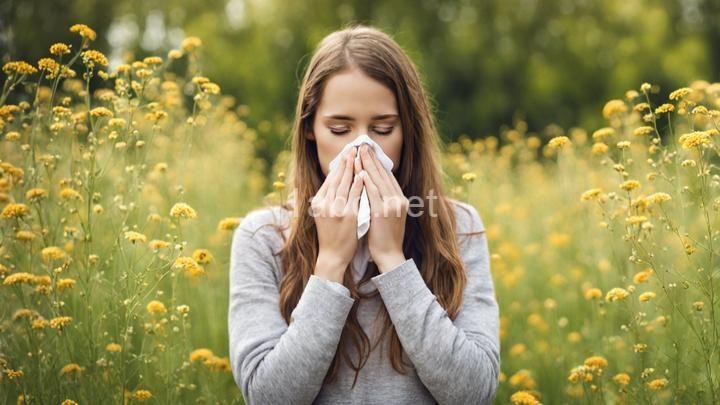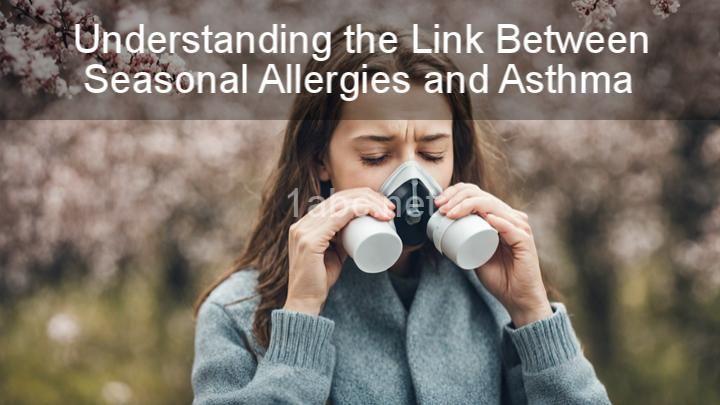Exploring Alternative Therapies for Allergy Management

Introduction:
Welcome to our blog post on alternative therapies for allergy management. As allergy sufferers know all too well, the constant sneezing, itching, and congestion can be incredibly frustrating. While traditional medicine offers various options for managing allergies, it's essential to explore alternative therapies that can provide additional relief. In this blog post, we will delve into the world of alternative therapies, discussing popular options, mind-body techniques, lifestyle modifications, and more. By the end of this article, you will have a comprehensive understanding of alternative therapies for allergy management and be empowered to embark on your journey towards finding effective relief.
I. Understanding Allergies:
Before we dive into alternative therapies, let's take a moment to understand what allergies are and how they affect individuals. Allergies occur when the immune system overreacts to substances that are typically harmless, such as pollen, pet dander, or certain foods. The immune system releases histamines, causing inflammation and triggering symptoms like sneezing, itching, watery eyes, and congestion. For those with severe allergies, these symptoms can significantly impact their quality of life.
Seeking alternative therapies for allergy management is crucial because traditional medications may not work for everyone or may come with unwanted side effects. Additionally, alternative therapies can provide a holistic approach to allergy management, addressing not only the symptoms but also the underlying causes.
II. Popular Alternative Therapies for Allergy Management:
A. Acupuncture:
One alternative therapy that has gained popularity in recent years for allergy management is acupuncture. Originating from ancient Chinese medicine, acupuncture involves the insertion of thin needles into specific points on the body to stimulate energy flow and restore balance. In the context of allergies, acupuncture aims to alleviate symptoms by reducing inflammation and boosting immune function.
Many allergy sufferers have reported significant relief after undergoing acupuncture treatments. Research studies have also shown promising results, with acupuncture being associated with a reduction in allergy symptoms and the need for conventional medications. However, it's important to note that acupuncture may not be suitable for everyone, especially those with bleeding disorders or a fear of needles. Consulting with a qualified acupuncturist is essential before considering this therapy.
B. Herbal Remedies:
Another avenue worth exploring for allergy relief is the use of herbal remedies. Certain herbs, such as stinging nettle and butterbur, have long been used in traditional medicine to alleviate allergy symptoms. Stinging nettle contains anti-inflammatory compounds that can help reduce histamine production, while butterbur has been shown to inhibit the release of inflammatory chemicals.
While herbal remedies can be promising, it's crucial to consult with a healthcare professional before incorporating them into your allergy management routine. They can assess potential interactions with any medications you may be taking and ensure that the herbs are safe for your specific condition.
C. Probiotics:
Probiotics, often referred to as "good bacteria," have gained significant attention for their role in supporting gut health and modulating the immune system. Studies have suggested that a healthy gut microbiome can help regulate the body's response to allergens, potentially reducing allergy symptoms.
Incorporating probiotic-rich foods like yogurt, sauerkraut, and kefir into your diet or taking probiotic supplements may be beneficial for allergy management. However, it's important to note that not all probiotics are created equal, and their effectiveness can vary. Consulting with a healthcare professional will help you determine the appropriate probiotic strain and dosage for your specific needs.
III. Mind-Body Techniques for Allergy Relief:
Beyond physical treatments, mind-body techniques can also play a vital role in managing allergies. These techniques focus on reducing stress, which can exacerbate allergy symptoms, and promoting overall well-being.
A. Breathing Exercises:
Deep breathing exercises can be a simple yet effective way to alleviate common allergy symptoms like nasal congestion and wheezing. By consciously slowing down and deepening your breath, you can reduce inflammation and promote relaxation. Practicing deep breathing exercises regularly can help build resilience against allergy symptoms over time.
To get started, find a comfortable seated position, close your eyes, and place one hand on your chest and the other on your abdomen. Take a slow, deep breath in through your nose, allowing your abdomen to rise as you fill your lungs with air. Exhale slowly through your mouth, feeling your abdomen fall. Repeat this process for a few minutes, focusing on the sensation of your breath.
B. Meditation and Relaxation Techniques:
Meditation and relaxation techniques can also help alleviate stress-related allergy symptoms. By quieting the mind and bringing awareness to the present moment, you can reduce the impact of stress on your body and immune system.
Various meditation techniques are available, ranging from focused attention meditation to loving-kindness meditation. Beginners can explore smartphone apps like Headspace or Calm, which offer guided meditation sessions for different purposes and durations. It's essential to find a technique that resonates with you and make meditation a regular part of your allergy management routine.
IV. Lifestyle Modifications to Support Allergy Management:
In addition to alternative therapies, certain lifestyle modifications can significantly contribute to managing allergies effectively.
A. Diet and Nutrition:
The foods we consume can impact our immune system and inflammatory response, making dietary modifications an important aspect of allergy management. Incorporating anti-inflammatory foods like fruits, vegetables, fatty fish, and nuts can help reduce allergy symptoms. On the other hand, it's advisable to limit or avoid inflammatory foods like processed foods, refined sugars, and excessive alcohol consumption.
Working with a registered dietitian or nutritionist can provide guidance on developing an allergy-friendly diet plan tailored to your specific needs and preferences. They can also help identify any potential food triggers that may be exacerbating your symptoms.
B. Environmental Changes:
Making changes in your environment can also support allergy management and reduce exposure to allergens. Here are some practical tips to consider:
- Invest in an air purifier: Air purifiers can help remove allergens like pollen, dust mites, and pet dander from the air, providing relief for allergy sufferers. Look for a purifier with a HEPA filter, as it can effectively capture small particles.
- Allergen-proof your bedding: Encasing your mattresses, pillows, and duvets in allergen-proof covers can prevent allergens from accumulating and triggering symptoms while you sleep.
- Regular cleaning routines: Regularly dusting, vacuuming, and cleaning surfaces can help minimize allergen accumulation in your home.
- Minimize exposure to outdoor allergens: During peak allergy seasons, try to limit your time outdoors, especially on days with high pollen counts. Wearing sunglasses and a hat can also help prevent allergens from coming into contact with your eyes and hair.
Conclusion:
Exploring alternative therapies for allergy management can be a game-changer for those seeking additional relief beyond traditional medication. Acupuncture, herbal remedies, probiotics, breathing exercises, meditation, dietary modifications, and environmental changes are just a few examples of the wide range of alternative therapies available.
It's important to remember that while alternative therapies can be effective, consulting with healthcare professionals is crucial before trying any new treatments. They can provide guidance, assess any potential risks or interactions, and ensure that the therapies are suitable for your specific condition.
By incorporating alternative therapies into your allergy management routine, you can take a holistic approach towards finding relief. With patience and an open mind, you'll be well on your way to discovering effective strategies that work for you. Here's to embracing alternative therapies and enjoying a life free from the burdens of allergies!
FREQUENTLY ASKED QUESTIONS
What is Exploring Alternative Therapies for Allergy Management?
Exploring Alternative Therapies for Allergy Management refers to the investigation and consideration of non-conventional approaches to alleviate or manage allergy symptoms. These therapies are often used as complementary or adjunct treatments alongside traditional medical interventions.
Alternative therapies for allergy management can include methods such as acupuncture, herbal medicine, homeopathy, naturopathy, aromatherapy, and dietary changes. These approaches differ from conventional allergy treatments, like antihistamines or immunotherapy, and are based on various philosophies and practices.
It is important to note that alternative therapies for allergy management may not have substantial scientific evidence supporting their effectiveness. Individuals considering these therapies should consult with a qualified healthcare professional to ensure their safety and appropriateness for their specific allergy condition.
How can alternative therapies help manage allergies?
Alternative therapies may help manage allergies by addressing underlying causes, strengthening the immune system, and alleviating symptoms. Some commonly used alternative therapies for allergy management include:
- Acupuncture: This ancient practice involves inserting thin needles into specific points on the body to balance energy flow and promote healing. Acupuncture may help reduce allergy symptoms by boosting the immune system and reducing inflammation.
- Herbal Medicine: Certain herbs and botanicals, such as nettle, butterbur, and quercetin, have been traditionally used to alleviate allergy symptoms. These herbs possess anti-inflammatory properties and may provide relief from nasal congestion, sneezing, and itching.
- Probiotics: Probiotics are beneficial bacteria that aid in digestion and support the immune system. Some research suggests that certain strains of probiotics may help modulate the immune response and reduce allergy symptoms.
- Homeopathy: This practice is based on the principle of "like treats like." Homeopathic remedies made from minute amounts of allergens are used to stimulate the body's natural healing response and reduce symptoms. However, scientific evidence supporting the efficacy of homeopathy for allergies is limited.
- Mind-Body Techniques: Various mind-body practices, including yoga, meditation, and deep breathing exercises, can help manage allergy symptoms by reducing stress and promoting relaxation. High stress levels can exacerbate allergy symptoms, so stress management techniques may be beneficial.
It is important to note that while some people find relief from alternative therapies, scientific evidence for their effectiveness is often limited. It is always recommended to consult with a qualified healthcare professional before incorporating alternative therapies into your allergy management plan.
Are alternative therapies safe to use for allergy management?
Alternative therapies for allergy management can vary widely in terms of safety and efficacy. While some alternative therapies may be safe to use under certain circumstances, it is important to approach them with caution and consult with a healthcare professional before trying them.
Here are a few commonly used alternative therapies for allergy management:
- Herbal remedies: Some herbal remedies, such as butterbur and stinging nettle, have shown potential in reducing allergy symptoms. However, it is crucial to consult a healthcare professional before using any herbal remedies, as they may interact with medications or have side effects.
- Acupuncture: Acupuncture has been used to alleviate allergy symptoms in some individuals. While generally considered safe, it is essential to choose a qualified and licensed practitioner to minimize the risk of adverse effects.
- Probiotics: Probiotics, particularly certain strains of beneficial gut bacteria, have been studied for their potential in managing allergies. While generally safe, it is advisable to speak with a healthcare professional to determine whether specific probiotics are suitable for your situation.
- Breathing exercises: Techniques such as nasal rinsing, nasal breathing exercises, and yoga breathing practices may offer some relief from allergy symptoms. These exercises are generally considered safe, but it's best to learn them under the guidance of a qualified instructor.
Remember, alternative therapies should not replace conventional medical treatments for allergies. It is essential to work with a healthcare professional to develop an individualized treatment plan that combines conventional medicine with any alternative therapies you choose to explore.
What are some common alternative therapies for allergy management?
There are several common alternative therapies that people use for managing allergies. These include:
- Acupuncture: This traditional Chinese medicine technique involves using thin needles to stimulate specific points on the body. It is believed to help relieve allergy symptoms by promoting balance and reducing inflammation.
- Herbal remedies: Various herbs and plants, such as butterbur, stinging nettle, and eucalyptus, are thought to have anti-allergic properties. They may be taken as supplements, teas, or used in essential oils.
- Probiotics: Certain strains of beneficial bacteria, when taken as supplements or found in certain foods like yogurt, may help regulate the immune system's response to allergens.
- Quercetin: This flavonoid antioxidant is found in foods like apples, onions, and red wine. It is believed to have anti-inflammatory and antihistamine effects that can help reduce allergy symptoms.
- Nasal irrigation: This involves rinsing the nasal passages with a saline solution to flush out allergens and reduce congestion. It can be done using a neti pot, squeeze bottle, or nasal spray.
- Air purifiers: These devices filter out allergens and irritants from the air, potentially reducing symptoms for individuals with allergies.
- Mind-body practices: Techniques like yoga, meditation, and deep breathing exercises can help alleviate stress, which may in turn reduce the severity of allergic reactions.
It's important to note that while some people find alternative therapies helpful, the evidence supporting their effectiveness is often mixed. It's always advisable to consult with a healthcare professional before starting any new treatment approach.




